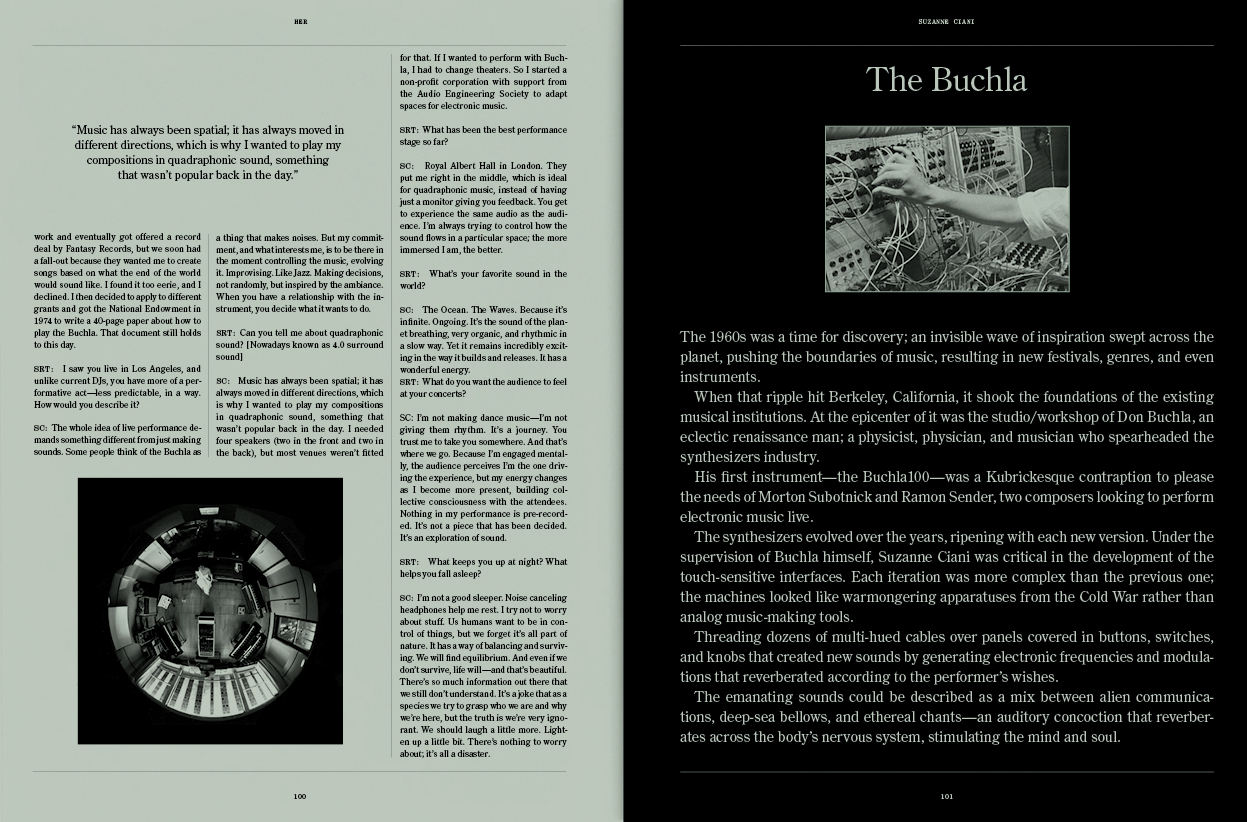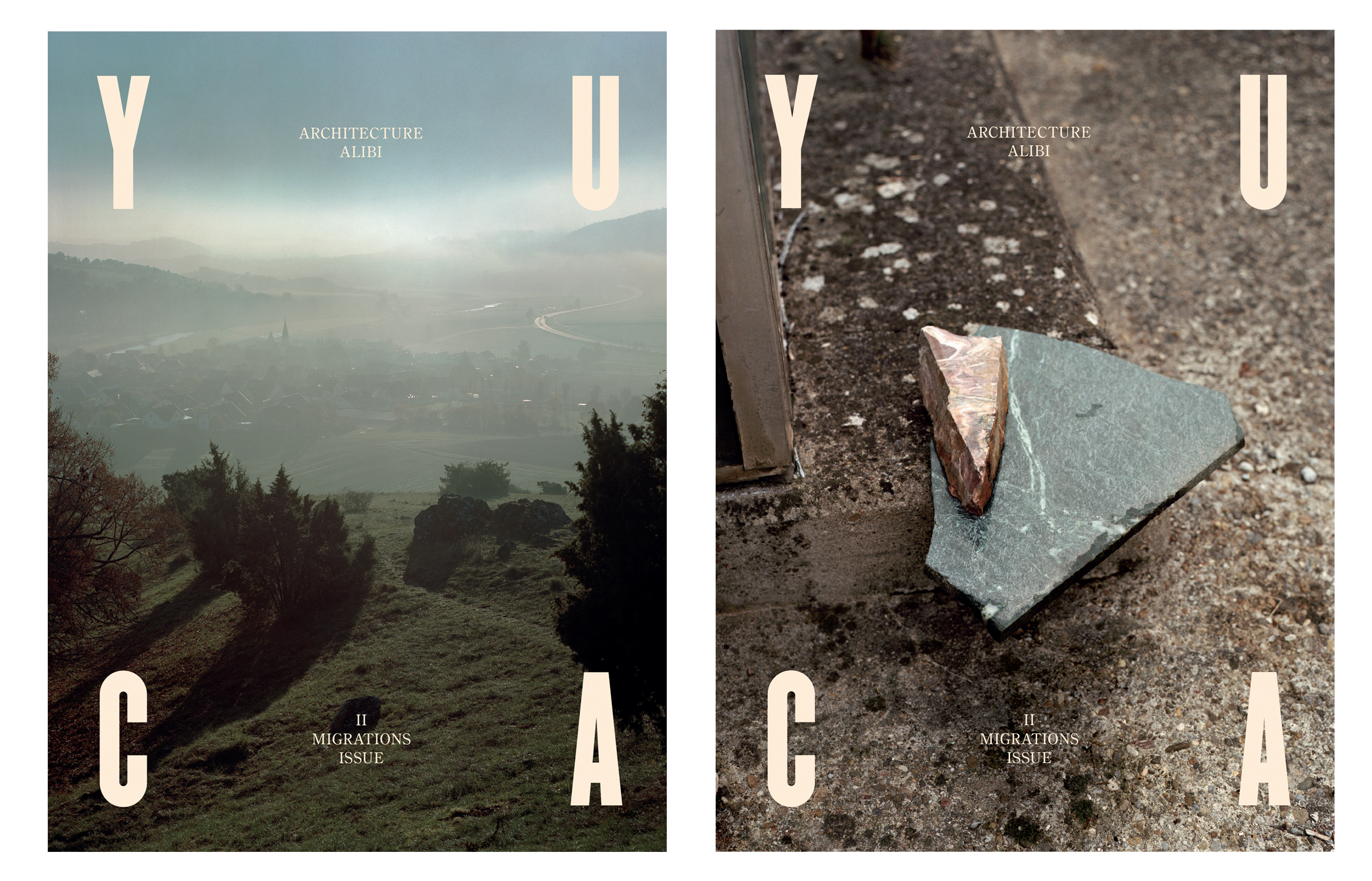III - The Sound Alibi & Time Issue
WHAT YOU WILL FIND IN THIS ISSUE:
Instructions to cultivate time. Scores with no notes, no endings, no beginnings. Quests for silence, images of noise.Wake up calls. Buzzing clocks. Hissing muted under water. The universe’s journey from fire to ice, and then from ice to fire. Filling out forms, emptied forms. A buchla played by a woman with light sleep. The omnipresence of absence. Eloquent silence. Futurist pasts. Archives of times to come. The voices and gestures of History. Tradition, Sci Fi and dystopia. Hopeless men. Hopeful millennials.
Our third issue is inspired by sounds and time, and everything that links them closely together, by the intense cacophony that sets the pace of life in the city, by the fierce chant of cicadas announcing dusk and the pleasant calm we feel when we wake up to birds singing —by all the sounds that make us move forward or backwards in time, everything that sets something in motion inside us without it being accompanied by sights, taste, smell or by the warmth of touch.
From the beginning of our time on earth we created sounds to communicate with each other and with the afterlife, with deities and the divine. Before written text was widespread, kin got together to orally transmit traditions to the youngest. Listening was everything then for humans to find their place in lineage and to connect with their future and their past. Our ancestors combined sounds to cause physical reactions in rituals and ceremonies and we actually continue to participate in a sort of spiritual ceremony when we listen to music sitting or standing next to people we know nothing about and yet feel strangely connected to. Sound moves us in a way that is different from everything else because it can bring tears to our eyes or prompt movement in our bodies, it even makes us get on our feet and dance!
And then there’s the occasional need for silence. For the absence of those sounds, of music and speech. But, unless it’s carefully produced in some sort of capsule, even silence has a voice of its own. We crave for it in life just as it appears in a musical composition or a choreography, in poetry, art, cinema and literature: we crave for it to give us pause, and the possibility to contemplate and take in a precise moment, or to find respite when overwhelmed. We humans long for it so much that when we invited this issue’s contributors to discuss Sound, we got answers that reflected on silence as a primal part of sound —they thought of our alibi in terms of “the absence of”. Also, when inviting them to give us their take on time many replied with ideas of memory, of past times, now replaced by fragmented remembrances. And this is how “absence” silently emerged as a third theme permeating our third issue, it emerged as a way to represent that which is not tangible even though it is forever present intertwining permanently with our existence.
We can see memory and absence in archival images and documents, which here also become building blocks, starting points for new creations; containers of our collective memory; fragments that bring us together in a unique way because they remind us of our common origins, and that we are all vessels through which others get to connect to the past and experience the passing of time. Here time is presented through the lens of astrophysics and Science Fiction and as a force informing a country’s motion into the future.
It is when sound ceases that you realize it was there, when a moment comes to an end you turn it into a memory to keep track of passing time. Both these notions are always there, although we can never fully measure or control them. The meaning of both, the way we apprehend both, fluctuates according to where we stand on earth, or outer space, or depending on our cultural background. Yet we take what we can because we need it to give order to chaos, to experience life, to move forward and make change possible.
CONTRIBUTORS
Writing
Lautaro Mantilla / Timothy Prus / Joao Lima / Sophie Blais / Xavi Alías / Anna Pahissa / Lina Rincón / Santiago Rodríguez Tarditi / Maral Deghati / Babak Jalali / Newsha Tavakolian / Andy Poole / Hans Laguna
Translation
Lina Rincón - Marble & Water
Invited Editors
Gita Cooper van Ingen
from Der Greif
Invited Curator - The Paper Gallery
Madelon van Schie
Photography, Art & Illustration
Edgar Martins / Katrin Koenning / Archive of Modern Conflict / Olga Capdevila / Pau G. Valls / Juliana Gómez Marinus Boezem / Teresa Burga / Felix Gonzalez=Torres / Marjin van Kreij / David Lamelas / Alexandra Leykauf / Raúl Marroquín / Raquel Maleurf / Oscar Abraham Pabón / Antonio Vega Macotela / Guido van der Werve / Mateo López/ Caspian Films / Newsha Tavakolian / Douglas Mandry / Carles Murillo / Annika Kappner / Carmen Triana / Andergraun Films


























